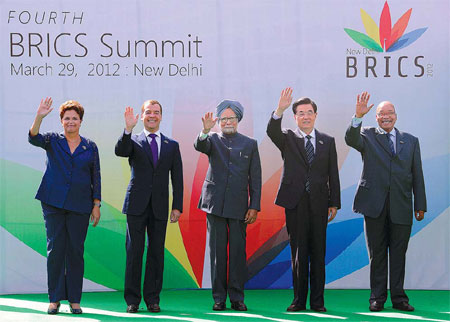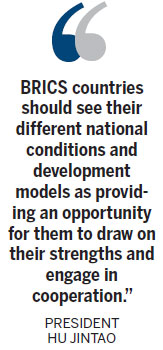'BRICS will work together more'
Updated: 2012-03-30 08:01
By Wu Jiao in New Delhi and Fu Jing in Brussels (China Daily)
|
||||||||
|
President Hu Jintao joins other leaders of the BRICS group for photos at the start of their summit in New Delhi, India, on Thursday. [Li Tao / Xinhua] |
|
|
President pledges greater unity as bank plan under consideration
President Hu Jintao on Thursday pledged that the BRICS group would "step up cooperation among fiscal and financial authorities", as the bloc signed key agreements on currency settlements and credit.
The leaders also decided at the New Delhi summit to examine the possibility of setting up a development bank for the bloc and other developing countries.
The development banks of Brazil, Russia, India, China and South Africa, signed a "Master Agreement In Extending Credit Facility" in local currencies and the "BRICS Multilateral Letter Of Credit Confirmation Facility Agreement".
The agreements are intended to reduce the demand for fully convertible currencies for transactions among the BRICS.
This will help reduce transaction costs for intra-BRICS trade.
The Delhi Declaration issued after the summit on Thursday also said that the leaders have considered the possibility of setting up a new development bank.
The bank will supplement the existing efforts of multilateral and regional financial institutions for global growth and development, the declaration said.
BRICS finance ministers will examine the feasibility of such an initiative and report back by the next summit.
South African President Jacob Zuma said the prospect of having a BRICS bank will "have the potential to help us create jobs in developing countries".
Hu, a keen advocate of cooperation in the bloc, also believed in the potential.
"BRICS countries should see their different national conditions and development models as providing an opportunity for them to draw on their strengths and engage in cooperation," Hu said.
Hu also urged the bloc to "enhance political trust through dialogue and exchange and fully accommodate major interests and concerns".
On issues where there is consensus, Hu advocates that the bloc should move forward vigorously.
"For those issues where there is currently no consensus, BRICS should take incremental steps to build up conditions for cooperation," Hu told his counterparts.
The five-member bloc represents 42 percent of the world's population, a quarter of its land mass and 20 percent of its economy at $13.5 trillion.
World Bank President Robert Zoellick, underscoring the importance of the emerging world's biggest economies with his own trip to India, welcomed the idea of a new development bank.
"We will be looking forward to working with it to see how we can leverage one another's strengths," he said while traveling in the eastern state of Orissa, according to the Press Trust of India. "It will complement the type of work we do."
Zoellick said the proposed bank may help India attract capital while helping China internationalize the renminbi.
The head of the global moneylender is ending his five-year term in June.
US President Barack Obama has nominated Korean-born US academic Jim Yong-kim to be the next president of the World Bank.
A US citizen has led the bank since it was founded in 1944 but developing nations say that now is a good time to change this tradition.
Two other candidates come from Nigeria and Colombia.
The bloc said that they welcome the candidacies from the developing world and want greater representation of developing economies in global financial institutions.
Intra-BRICS trade is about $230 billion and has the potential of more than doubling to $500 billion by 2015. Local-currency settlements will cut the foreign exchange costs for trading participants, which is estimated by business groups to be up to 4 percent of the transaction volume.
While the BRICS countries account for 15 percent of total world exports, in 2011, trade among the BRICS made up only 1.5 percent of global exports, although the figure has already increased fivefold compared with that of 2000.
According to Vladimir Dmitriev, chairman of Vnesheconombank, Russia's development bank, expanding the use of local currencies in settlements will contribute to more transparent pricing.
However, the practice might be constrained by inadequate regulatory systems for foreign exchange in the bloc, which currently promote international payments in dollars or euros, Dmitriev warned.
Chi Fulin, president of the China Institute for Reform and Development, said that providing a line of credit is "a substantial step to strengthen the bloc's economic integration and vital for the establishment of a joint bank.
"The benefit of a BRICS bank will go beyond BRICS to other developing countries," Chi said.
The BRICS bank, together with World Bank and International Monetary Fund, will become part of the changing international financial and monetary regime, Chi said.
Analysts also said that the agreements will be significant in facilitating the wider acceptance of China's currency and boosting commodity and energy deals with Russia and Brazil.
Li Jian, a researcher with the Ministry of Commerce, said in a recently published essay that local currency settlement will quicken the internationalization of the currency.
Ade Onitolo, director of political risk forecasting at London-based Exclusive Analysis, said "in the next decade such arrangements will underpin the growing trade and investment relationships between emerging markets and the progress on making these currencies convertible".
"The initiative reflects a goal of BRICS economies to reduce dependence on the dollar and the euro, but significant progress is about 10 years away," said Onitolo, adding that "it is clear that emerging markets are gradually overtaking developed ones as engines of global growth".
Contact the writers at wujiao@chinadaily.com.cn and fujing@chinadaily.com.cn

 Relief reaches isolated village
Relief reaches isolated village
 Rainfall poses new threats to quake-hit region
Rainfall poses new threats to quake-hit region
 Funerals begin for Boston bombing victims
Funerals begin for Boston bombing victims
 Quake takeaway from China's Air Force
Quake takeaway from China's Air Force
 Obama celebrates young inventors at science fair
Obama celebrates young inventors at science fair
 Earth Day marked around the world
Earth Day marked around the world
 Volunteer team helping students find sense of normalcy
Volunteer team helping students find sense of normalcy
 Ethnic groups quick to join rescue efforts
Ethnic groups quick to join rescue efforts
Most Viewed
Editor's Picks

|

|

|

|

|

|
Today's Top News
Health new priority for quake zone
Xi meets US top military officer
Japan's boats driven out of Diaoyu
China mulls online shopping legislation
Bird flu death toll rises to 22
Putin appoints new ambassador to China
Japanese ships blocked from Diaoyu Islands
Inspired by Guan, more Chinese pick up golf
US Weekly

|

|









